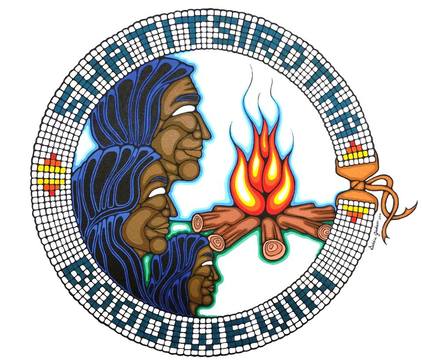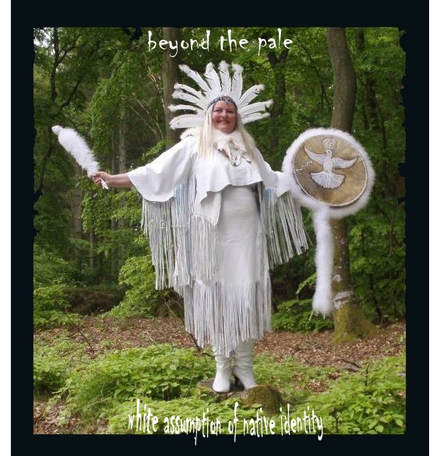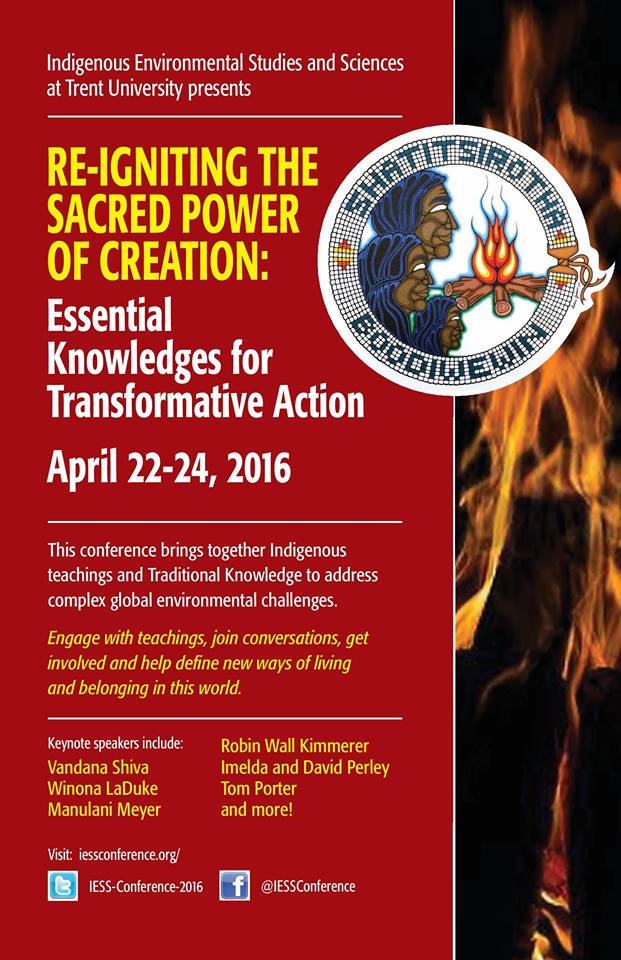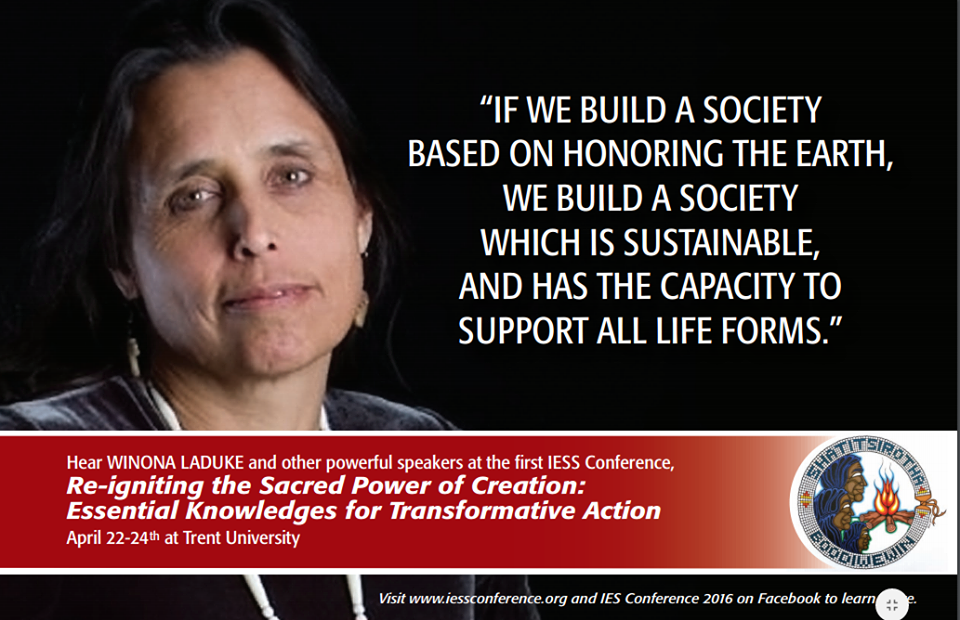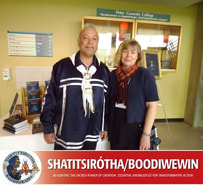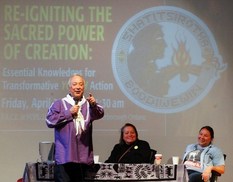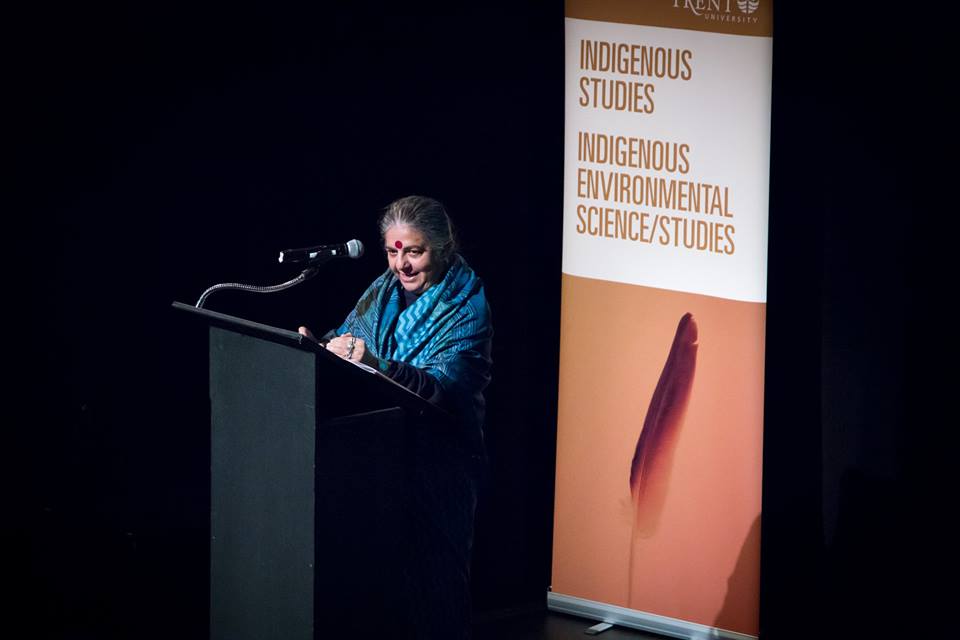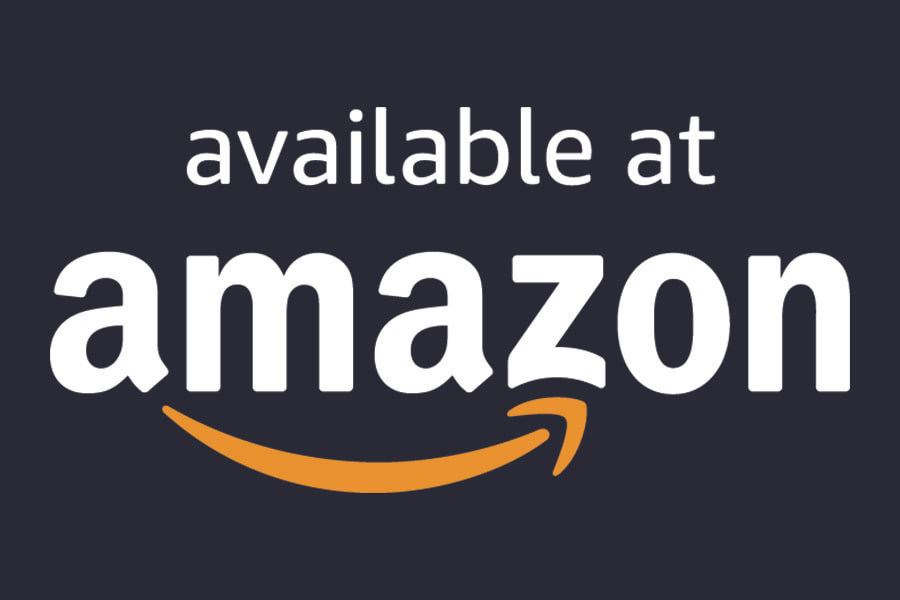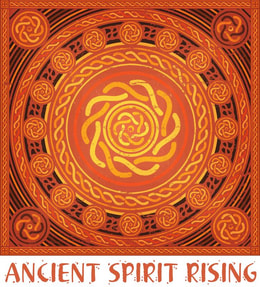PEGI EYERS
Transcript of my presentation at the conference Shatitsirotha Boodiwewin/ Re-Igniting the Sacred Power of Creation: Essential Knowledges for Transformative Action hosted by Trent University, Indigenous Environmental Studies and Sciences, April 22-24, 2016. Such an amazing time!
My name is Pegi Eyers, and I am the author of the award-winning book Ancient Spirit Rising: Reclaiming Your Roots & Restoring Earth Community. I live here in the Peterborough area - Nojogiwanong in the language of the Michi Saagiig Nisnaabeg, who are the original Earthkeepers of this land. As I wrote my book I also went on a personal learning journey, and I would like to invite you to travel with me through the many themes in Ancient Spirit Rising, and how I discovered the links between them.
I have been blessed with a wide range of learning experiences and close proximity to First Nations friends and community over the years, and the starting point for my book began here at Trent. At an Elders Gathering in 2010, I heard revered teacher and traditional Midewiwin leader James Dumont say "Everyone needs to get back to their own Indigenous Knowledge.” I was stunned by this remark, and how he was referencing two important points at the same time. First, he was referring to the harm that is being done by white folks who take on the spiritual and cultural property of First Nations and assume native identities, and secondly, he was giving us a great blessing by implying that Indigenous Knowledge IS the collective birthright of all humanity, and that we all have original Indigenous Knowledge (or the acronym IK). And what resonated with me on a deep level in James Dumont’s monumental directive was the unspoken understanding, and the paradox perhaps, that reclaiming earth-connected cultures and recovering tribal ways will be the best way forward for all of us, in times of massive change.
Yet just where was our IK located as non-native people, and how did those of us descended from the Settler Society lose our ancestral connections in the first place? Like a long-lost trail gone cold, this inquiry is what drove my research and writing toward the completion of Ancient Spirit Rising. What I found out is that in our rush to colonize the Americas, we gave up our bonds to our places of ethnic origin, and our indigeneity as connected to those lands. Consciously or not, with the founding of the Americas, we sacrificed whatever spiritual ecology and ancestral knowledge we still held from our homelands, and the result today is a serious lack of interest in having any ethnocultural identity whatsoever, or even why that would be important. Belonging to a nation-state like “Canada” or the “USA” is not an “ethnicity” or even a “culture” in the strictest sense of the word, unless you count patriotism or capitalism as your ideals, which in my view are questionable loyalties. Finding our long-lost ancestral tradition is a huge challenge, but this is exactly what is being asked of us by James Dumont and other First Nations academics, thought leaders, activists and visionaries.
I have been blessed with a wide range of learning experiences and close proximity to First Nations friends and community over the years, and the starting point for my book began here at Trent. At an Elders Gathering in 2010, I heard revered teacher and traditional Midewiwin leader James Dumont say "Everyone needs to get back to their own Indigenous Knowledge.” I was stunned by this remark, and how he was referencing two important points at the same time. First, he was referring to the harm that is being done by white folks who take on the spiritual and cultural property of First Nations and assume native identities, and secondly, he was giving us a great blessing by implying that Indigenous Knowledge IS the collective birthright of all humanity, and that we all have original Indigenous Knowledge (or the acronym IK). And what resonated with me on a deep level in James Dumont’s monumental directive was the unspoken understanding, and the paradox perhaps, that reclaiming earth-connected cultures and recovering tribal ways will be the best way forward for all of us, in times of massive change.
Yet just where was our IK located as non-native people, and how did those of us descended from the Settler Society lose our ancestral connections in the first place? Like a long-lost trail gone cold, this inquiry is what drove my research and writing toward the completion of Ancient Spirit Rising. What I found out is that in our rush to colonize the Americas, we gave up our bonds to our places of ethnic origin, and our indigeneity as connected to those lands. Consciously or not, with the founding of the Americas, we sacrificed whatever spiritual ecology and ancestral knowledge we still held from our homelands, and the result today is a serious lack of interest in having any ethnocultural identity whatsoever, or even why that would be important. Belonging to a nation-state like “Canada” or the “USA” is not an “ethnicity” or even a “culture” in the strictest sense of the word, unless you count patriotism or capitalism as your ideals, which in my view are questionable loyalties. Finding our long-lost ancestral tradition is a huge challenge, but this is exactly what is being asked of us by James Dumont and other First Nations academics, thought leaders, activists and visionaries.
As a deep thinker and spiritual person, I had spent many years observing and sometimes even participating in the world of New Age Spirituality, and even though I was put-off by the white folks pretending to be “shamans” or Indigenous, I did not fully understand at the time how “Native Spirituality” had been normalized as just another genre or niche modality in our endless array of spiritual choices. But thanks to a great deal of “tough love” from my strong First Nations teachers, plus my own research on cultural appropriation, I soon uncovered the truth about this modern phenomena.
Of course, the first objection social justice activists hear over and over (mostly from people who don’t want to give up “Native Spirituality” because it is just so much fun) is that intercultural sharing is normal and has happened throughout time. Yet the truth is, healthy cultural exchange can only take place between societies that are on equal footing, without one dominating or oppressing the other, and that the sharing is done in a respectful way under the direction of the sharer. This is certainly not the case here in the Americas, as the oppressor/oppressed and colonizer/colonized dynamic has been the driver for building Empire, and guess which side of that relationship we are on as white people? And just because one is spiritual, or Pagan, or New Age, or feminist, or neoliberal, or whatever, does not give that person a “passcard” from being a member of the dominant white society.
Of course, the first objection social justice activists hear over and over (mostly from people who don’t want to give up “Native Spirituality” because it is just so much fun) is that intercultural sharing is normal and has happened throughout time. Yet the truth is, healthy cultural exchange can only take place between societies that are on equal footing, without one dominating or oppressing the other, and that the sharing is done in a respectful way under the direction of the sharer. This is certainly not the case here in the Americas, as the oppressor/oppressed and colonizer/colonized dynamic has been the driver for building Empire, and guess which side of that relationship we are on as white people? And just because one is spiritual, or Pagan, or New Age, or feminist, or neoliberal, or whatever, does not give that person a “passcard” from being a member of the dominant white society.
As an extension of the racism we hold and our white privilege and power, cultural appropriation happens without the permission of First Nations, and is another extension of the same colonial agenda, which moves first to seize the land, then the resources, and finally, elements of the Indigenous cultural identity that have already been subjected to genocide. More than just the lifting of ideas, practices or physical objects, cultural appropriation and identity theft dominates the way oppressed groups represent themselves to the world. This interference, stereotyping and loss of basic human dignity violates basic human rights, and in response to the problem, First Nations worldwide have united to formulate the United Nations Declaration on the Rights of Indigenous Peoples, a document that protects spiritual property and re-instates much-needed cultural boundaries.
Learning how the widespread and seemingly innocent New Age “Native Spirituality” genre was such a serious issue, I went on to explore in my book a full range of questionable and delusional beliefs, in what I have come to call "New Age Capitalism." After that highly volatile chapter I then connect the dots by examining Settler-Colonialism, the origins of racism, the erroneous science of “racial theory,” white privilege, false nationalist narratives, and the need for ethics and a moral code in all walks of life.
Concluding with a section on giving back to First Nations instead of take-take-take, I outline how we can engage in Allyship, solidarity and social justice work, and I even throw in a poem or two for good measure! The 16 chapters that comprise the first part of the book challenge many of the assumptions we hold and shake up worldviews - but in contrast, Part Two of Ancient Spirit Rising is very uplifting and empowering.
Learning how the widespread and seemingly innocent New Age “Native Spirituality” genre was such a serious issue, I went on to explore in my book a full range of questionable and delusional beliefs, in what I have come to call "New Age Capitalism." After that highly volatile chapter I then connect the dots by examining Settler-Colonialism, the origins of racism, the erroneous science of “racial theory,” white privilege, false nationalist narratives, and the need for ethics and a moral code in all walks of life.
Concluding with a section on giving back to First Nations instead of take-take-take, I outline how we can engage in Allyship, solidarity and social justice work, and I even throw in a poem or two for good measure! The 16 chapters that comprise the first part of the book challenge many of the assumptions we hold and shake up worldviews - but in contrast, Part Two of Ancient Spirit Rising is very uplifting and empowering.
| The good news is that the call to reclaim our own IK can be reframed by the many new exciting movements already happening in Rewilding, Primitivism, Deep Ecology, Animism, Paganism, Druidry, Ecopsychology and Celtic Reconstructionism, and our cultural recovery is well underway. There has never been a time before in human history when DNA testing, genealogy, historical records, myth and archaeology have been so readily available, and if somewhat challenging, reclaiming our own ancestral knowledge is not all that difficult. Yet the process of re-indigenization and becoming connected to place must also mean rejecting Empire and the dictatorship of the western paradigm, with its unsustainable economic system, religious dominance, white supremacy, intersectional oppressions, harmful technology and all the philosophies that are killing the planet. |
By unsettling the settlers, and declaring ourselves as earth-connected peoples once again, we are reaffirming a return to ourselves, to a respect for all life, to earth-connected culture, and to honoring the Earth in all we think, say and do. What could be more important?
To truly walk the talk of the new paradigm will mean spending more time in nature than we already are, to see the world again as an interconnected part of the whole, and to experience creation as our Ancestors once did. In Ancient Spirit Rising I set out in clear and detailed charts the aspects of Western Mind that we may want to revise or discard, and elements of Indigenous Mind that we may want to encourage or embrace on our healing journey. If reclaiming our own ancestral wisdom traditions just don’t click, there are other movements to adopt such as earthing, permaculture, post-peak living or the Transition Town movement that can reconnect us to community, land and sustainable values. And ultimately, we cannot do the work of ethnocultural recovery without working as Allies for First Nations in social justice at the same time, and moving together toward retribution, reconciliation and hopefully in the end, peaceful co-existence.
In closing I would like to say that I am not a self-proclaimed “spokesperson” for First Nations community. I am simply passing on information and data that I have gathered over time, and you can do the exact same thing should you feel the urgency of this important knowledge. In accordance with what First Nations are telling us, it is up to those of us in the Settler Society to inform and educate our white cohort on the colonialism, racism, genocide, oppression, assimilation and cultural appropriation that has decimated Indigenous societies in the Americas since Columbus made landfall, and that is exactly what I am doing. First Nations are experts on their survivance and resistance to Empire, yet it is time for Settlers to also take up the struggle. It is the members of the dominant society that need to reverse racism, and finally, to take responsibility to clean up the mess created by the white supremacist founding of Empire in the Americas.
To truly walk the talk of the new paradigm will mean spending more time in nature than we already are, to see the world again as an interconnected part of the whole, and to experience creation as our Ancestors once did. In Ancient Spirit Rising I set out in clear and detailed charts the aspects of Western Mind that we may want to revise or discard, and elements of Indigenous Mind that we may want to encourage or embrace on our healing journey. If reclaiming our own ancestral wisdom traditions just don’t click, there are other movements to adopt such as earthing, permaculture, post-peak living or the Transition Town movement that can reconnect us to community, land and sustainable values. And ultimately, we cannot do the work of ethnocultural recovery without working as Allies for First Nations in social justice at the same time, and moving together toward retribution, reconciliation and hopefully in the end, peaceful co-existence.
In closing I would like to say that I am not a self-proclaimed “spokesperson” for First Nations community. I am simply passing on information and data that I have gathered over time, and you can do the exact same thing should you feel the urgency of this important knowledge. In accordance with what First Nations are telling us, it is up to those of us in the Settler Society to inform and educate our white cohort on the colonialism, racism, genocide, oppression, assimilation and cultural appropriation that has decimated Indigenous societies in the Americas since Columbus made landfall, and that is exactly what I am doing. First Nations are experts on their survivance and resistance to Empire, yet it is time for Settlers to also take up the struggle. It is the members of the dominant society that need to reverse racism, and finally, to take responsibility to clean up the mess created by the white supremacist founding of Empire in the Americas.
Pegi Eyers is the author of Ancient Spirit Rising: Reclaiming Your Roots & Restoring Earth Community, an award-winning book that explores strategies for social justice, uncolonization, ethnocultural identity, building land-emergent community & resilience in times of massive change. Available from Stone Circle Press or Amazon
Dan Longboat/Roronhiakewen/He Clears the Sky (Haudenosaunee),
Event Visionary, with Pegi Eyers (L) and Team (R).
Event Visionary, with Pegi Eyers (L) and Team (R).
